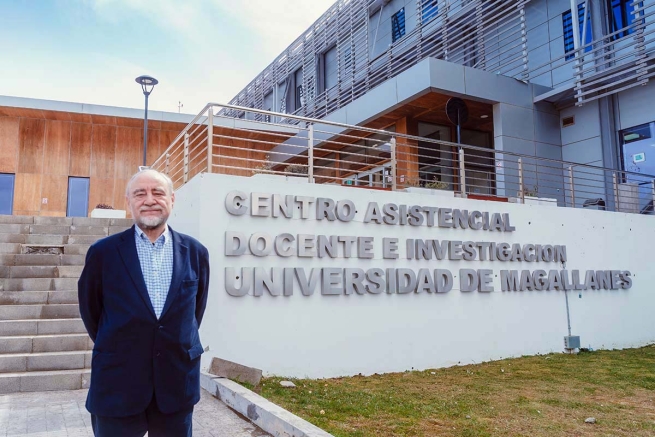Alzheimer's is a neurodegenerative disease that affects millions of people worldwide, and both a medical and a social challenge. Chile faces the challenge of an increasingly ageing population that requires specialised care. It is projected that by 2050, more than 550,000 people in the country will be living with some form of dementia, Alzheimer's being the most common.
Although there is no definitive cure, research is advancing in understanding the mechanisms behind the disease with a holistic approach that considers biological, environmental and lifestyle factors to lessen the impact of the disease.
Grateful for the formation
‘My time at the Salesian school in Valdivia was very important. I came from Puerto Montt. My father was transferred and didn't k now much about a Catholic school. So I entered and found a very pleasant situation: first there was a nice gymnasium; I liked basketball, I played for the school team, it wasn't the best, but it was one of the good ones’.
‘Our house was a block and a half from the school, so I could come and go as I wanted. We were lucky to have Professor Hans, a very remarkable biology teacher. He would bring us cut-up brains that he had, some plastic and some animal brains that were prepared."
‘The approach we had to biology was very close and real. It wasn't from a book, it was to see what the brain and muscles were. Everyone remembers Professor Hans.
‘Then I entered medicine at the University of Chile, but I changed to the Catholic University in my third year. Professor Luco, a national prize winner, the father of neurophysiology, was there. That made me decide to stay, finish my degree and doctorate. Then I did my post-doctorate in the United States and when I came back I started working in an area where there was no researcher in Chile: Alzheimer's’.
Improving quality of life
Emotional support and proper care are essential to improve the quality of life of people with the disease. In this regard, Dr Inestrosa comments that ‘although there is no definitive solution, there are ways to reduce its impact’.
‘99.9 per cent of the Alzheimer's you encounter is not genetic. The reality is that there are other factors that determine whether the disease expresses itself. These have to do with diet - eating too much cholesterol, meats and sausages promotes circulatory problems and causes fats to accumulate in the arteries. Obviously, too much bread, pastries, cakes and dough in general.
Metabolic syndrome is a set of five factors that, according to Dr Inestrosa, increase the risk of developing Alzheimer's disease. These include hypertension, high blood sugar levels, excess abdominal fat, low ‘good’ cholesterol and high triglyceride levels. If these conditions are controlled, ‘the number of people with Alzheimer's would be much lower’.
Disease prevention and control
Brain health is also affected by external factors, such as sun exposure. In regions such as Magallanes, where sunlight is scarce, many people have low vitamin D levels, which can aggravate certain Alzheimer's-related conditions.
Dr Inestrosa points out: "Here people wake up in winter when it's dark, while in summer at 12 midnight it's as if it were daytime. This ends up altering people's biological clock, causing the production of elements that require the sun, such as vitamin D, to work badly. This means that many pathologies associated with vitamin D deficiency are much more prevalent in this region than in the north.
Despite advances and studies, brain health does not depend only on these compounds, but largely on our lifestyle.
Dr. Inestrosa stresses the importance of a healthy lifestyle and its impact on prevention: ‘You can do a lot in the fight against Alzheimer's by having a good diet, exercising, giving up cigarettes and forgetting about alcohol. If you want to prepare yourself, you have to be physically fit, otherwise you lose muscle and body strength.
Alzheimer's remains one of the greatest medical and social challenges of our time, and despite understanding its causes and ways of prevention, no one is fully prepared to face this reality.
Science does not stand still, and as long as committed people like Dr. Inestrosa continue to research and innovate on the unique benefits of our biodiversity, there is still hope that in the future Alzheimer's will be treatable.
After all, it is our memories and human connections that are most precious.
by Joaquín Castro
https://www.infoans.org/en/sections/interviews/item/23191-chile-former-salesian-student-in-the-fight-against-alzheimer-s-disease#sigProId84831c64ff



